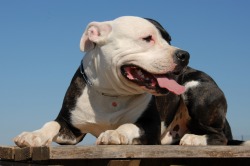Research in American Staffordshire Terriers Gives Scientists a Fresh Look at a Rare Human Disease
Neuronal ceroid lipofuscinoses (NCLs) are the most common type of progressive brain disease seen in children. These inherited diseases cause visual, mental, and physical abilities to degenerate over time, cumulating in premature death. However, children are not the only ones who suffer from NCLs – these disorders can also occur in older adults, although such late-onset NCLs are rarer and much less well understood.
The late-onset NCL known as Kufs’ disease has remained particularly elusive to doctors and scientists. Neither its genetic cause nor its mechanism of action is known, and the disease has been extremely difficult to study due to its rarity and the lack of a useful animal model. That may be changing, however, due to the discovery of a condition similar to Kufs’ disease that affects a larger group of individuals – individuals that just happen to be American Staffordshire Terriers (Amstafs).

The reason that late-onset NCLs are relatively common in Amstafs, as well as in Old English Sheepdogs, Scottish Terriers, and Gordon Setters, is that in dogs these diseases are controlled by a recessive mutation. This means that dogs won’t get sick unless they inherit two copies of the problematic gene variant. Because of this, and the fact that symptoms don’t show up until relatively late in life, the mutation is distributed widely through the Amstaf population. Scientists have estimated that 39 percent of Amstafs have at least one copy of the dangerous allele. However, even with a mutation that common, it still isn’t easy to identify a responsible gene.
Embracing the challenge with support from the AKC Canine Health Foundation, Dr. Natasha Olby and her colleagues from North Carolina State University began to search the Amstaf genome for the responsible gene. First, they narrowed down the hunt to one small region of the genome. Then they identified three candidate genes. Finally, they started to sequence.
The first two genes the scientists sequenced were dead ends. Fortune smiled upon them, however, when they teamed up with a group of French researchers who were also looking at neurodegenerative diseases in Amstafs … and who had just sequenced the third gene. Working together, and looking at dogs from both sides of the Atlantic, the scientists were able to confirm that a mutation in the gene in question - Arylsulfatase G (ARSG) – was in fact the cause of the late onset NCL in Amstafs.
A test based on the results of their research has already hit the market, but even more exciting is the fact that their results are helping scientists to develop a better understanding of how late-onset NCLs affect the brain and body. The ARSG mutation associated with the canine NCL greatly reduces the enzyme’s activity – which, over-time, could lead to the build-up of lysosomal materials that is seen in tissue samples of humans and dogs with NCLs.
This work was funded by AKC Canine Health Foundation Grant 925.
Scientific publication:
Related Articles
Related Genetic Test
Help Future Generations of Dogs
Participate in canine health research by providing samples or by enrolling in a clinical trial. Samples are needed from healthy dogs and dogs affected by specific diseases.



